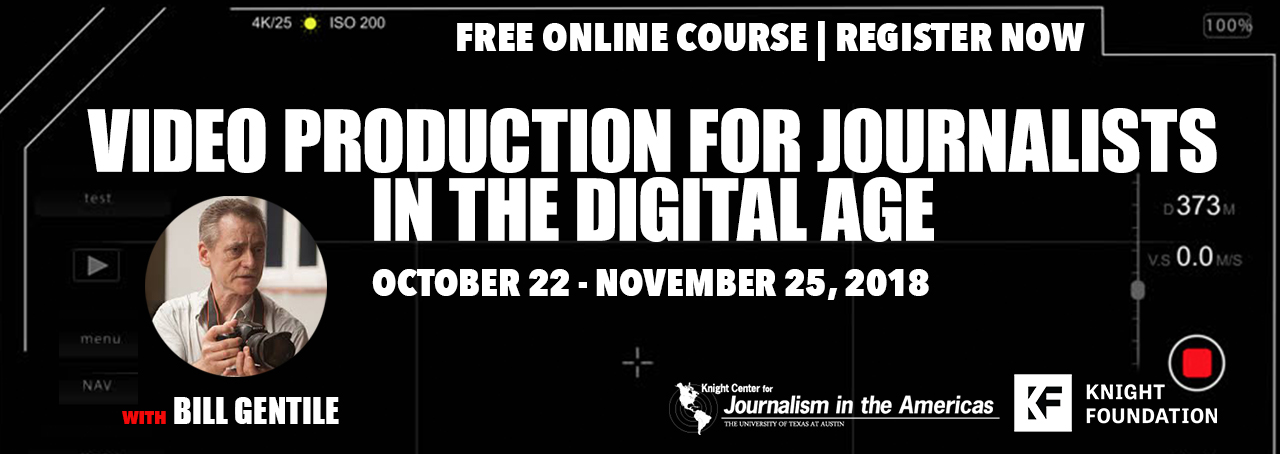Video production has become an increasingly important skill for journalists who want to be versatile and tell stories in a variety of ways.
With this in mind, the Knight Center for Journalism in the Americas is offering a new Massive Open Online Course (MOOC) on video production. The five-week course, titled “Video Production for Journalists in the Digital Age,” runs from Oct. 22 through Nov. 25, 2018.

Registration is now open for the course, which will be taught by Bill Gentile, a longtime journalist and documentary filmmaker who teaches at American University. The course is being offered for free thanks to generous support from the John S. and James L. Knight Foundation.
 Instructor Bill Gentile
Instructor Bill Gentile“I want people taking this course to walk away with the confidence that they can use the technology and the techniques that I cover to speak the visual storytelling language and participate in the global conversation that we call ‘visual journalism,’” said Gentile, who is a pioneer of backpack video journalism and author of the highly acclaimed “Essential Video Journalism Field Manual.”
Gentile will lead students through five weekly modules that will cover the gamut of video production: conception, pre-production, production, script and treatment writing, narration and editing, post-production and promotion. Students will view short films and read video scripts throughout the course, and they’ll learn practical, real-world tips to enhance their video storytelling techniques. By the end of this course, students will be able to produce professional quality videos for television and the Internet.
The course is geared toward journalists, but open and relevant to anyone interested in video production. It’s intended for both newcomers and more experienced videographers who want to sharpen or expand their video skills. Gentile will teach students through a mix of content, including video classes, readings, discussion forums, and quizzes.
The MOOC is asynchronous, meaning students can access and complete the course activities during the days and times that best suit them. There are, however, recommended deadlines so that students don’t fall behind.
Participation in the course is free. At the end of the course, students will have the option of paying an administrative fee of U.S. $30 for a certificate of completion, which they’ll be able to download as a PDF. No formal college credit is associated with this certificate.
In his introductory video to the course, Gentile says: “Now we stand at an extraordinary juncture in the history of mankind, technology and communication. … We can communicate instantly, globally, and in a language that all human beings can understand: the visual storytelling language.”
“With this excellent course, we hope to help journalists who have already started or are planning to start to use video to tell stories. Video is everywhere these days and this is a great opportunity to improve your abilities to produce quality videos, learning from a veteran videographer and instructor,” said professor Rosental Alves, founder and director of the Knight Center. “We are lucky to have Bill Gentile as the instructor of this MOOC and grateful also to the Knight Foundation for their support of our program of online courses that offer free training for thousands of journalists from around the world.”
Hone your visual storytelling skills by registering now for the Knight Center’s “Video Production for Journalists in the Digital Age” MOOC -- an important course for anyone who wants to become a better videographer.
About the John S. and James L. Knight Foundation
The Knight Foundation is a national foundation with strong local roots that invests in journalism, the arts and in the success of cities where brothers John S. and James L. Knight once published newspapers. Its goal is to foster informed and engaged communities, which it believes are essential for a healthy democracy. For more, visit kf.org.
About the Knight Center
The Knight Center for Journalism in the Americas was created in 2002 by Professor Rosental Alves, Knight Chair of Journalism at the Moody College of Communication at the University of Texas, thanks to the generous donations of the John S. and James L. Knight Foundation. The Knight Center’s distance learning program began in 2003 and is funded in part by the Knight Foundation. Over the past six years, the Knight Center MOOCs have reached more than 175,000 people in nearly 180 countries.
